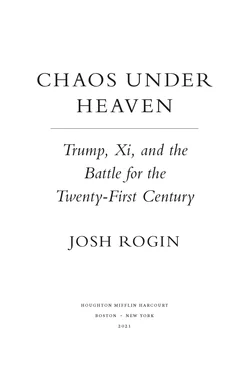Despite the unproductive nature of their Friday meeting, the two sides decided to meet again the following day, but the same dynamic played out. Yang and Cui returned for another meeting at Kushner’s office building Saturday. Kushner was absent because it was the Sabbath. There was more scolding of the American side by the Chinese officials. Yet Bannon and Navarro at least came away satisfied that the Chinese leadership would get the message that this administration was not interested in business as usual. They wanted Beijing to know that Trump’s representatives had rejected its proposal to have the United States stand aside while China expanded its power and abused its leverage.
The Chinese delegation did indeed appear to have received that message. But it was only one of many conflicting signals that people close to Trump were sending—and which were coming from outside the new administration, as well as from within it.
What everyone could agree on was that the US-China relationship under Trump was clearly off to a rocky start. The meetings compounded the shock and confusion of the Chinese leadership, which had been banking on a Hillary Clinton win and a continuation of the Obama administration’s soft-glove approach to China. Only one month earlier, exactly one week before the election, Yang had met with a team of high-ranking Obama administration officials. And from these outgoing American power brokers, Yang got a completely different message about the US approach to China.
There were several senior Obama administration and government officials in the room at the Palace Hotel on Tuesday, November 1, but the US contingent was led by National Security Adviser Susan Rice and Secretary of State John Kerry. The quiet confab was part of a series of personal high-level interactions the Obama team had with their Chinese counterparts over the course of the second term. For example, in 2014, Kerry had hosted Yang at his Boston home for two days, to build their personal ties. The Obama team was trying to establish relationships they thought would net positive changes in Chinese behavior. They were focused on areas of cooperation with China, not areas of contention. The outgoing Obama team was attempting to reassure Beijing’s top leadership that the relationship was getting closer and Clinton would continue the trend.
One official who was in the November 1 meeting in New York said that Rice had tried to get Yang to help plan contingencies for a regime collapse scenario in North Korea. This official recalled that the attendees felt the meeting seemed to have gone very smoothly. “It was a table setting exercise for the new administration,” this Obama administration official who attended told me. “We walked out of this meeting thinking this was one of the more constructive conversations we had with the Chinese side.”
The Chinese government readout of the meeting claimed Rice, Kerry, and Yang were working to implement the “important consensus” that Chinese president Xi and Barack Obama had supposedly reached at their previous meeting in China. It also said Rice and Kerry agreed to “expand pragmatic cooperation and properly manage differences, so as to promote the sustained and stable development of China-US relations.” The White House’s readout of the meeting mimicked this language.
This meeting was not about confronting China on trade or human rights; quite the opposite. The Obama team wanted to coordinate with Beijing on everything from climate change to Iran to counterpiracy. In effect, without stating it publicly, they were giving in to Beijing’s long-sought desire for a world governed by what Xi originally pitched directly to Obama at their 2013 Sunnylands summit as “the new model of relations between great powers”—a system in which the United States would no longer treat China as the junior partner in the relationship, would avoid criticizing China’s internal actions, and would allow China greater influence over world affairs. Rice herself in 2013 pledged to “operationalize” that concept, and Obama said in 2014 when meeting Xi that he was “committed to continuing to strengthen and build a new model of relations.”
Toward the end of his second term, Obama stopped referring publicly to Xi’s “new model,” but in effect he was still acceding to it, by directing his senior officials to explore a new US strategy to deal with China, one that would allow Beijing more influence in its near abroad and recognize a larger role for China in the region. Obama wanted his team to set new “lines of control” that would give in to some of China’s desires for expansion and power. Ben Rhodes, Obama’s deputy national security adviser and chief foreign policy speechwriter for eight years, said Obama wanted to figure out a way to have “the no bullshit conversation” with China’s leaders about their real ambitions. For instance, Obama wanted to find a way to acknowledge the reality of China’s increased presence in the South China Sea, without allowing Beijing to take over the entire area. Obama wanted to know “where do we have to draw our red lines and how do we communicate that to the Chinese,” Rhodes said. Obama’s view, he recalled, was, “Hey, they are going to play a bigger role in the world.” The president wanted his team to “set up a capacity [with Beijing] to have a conversation about, ‘What do you try to define as your sphere of influence?’”
To many foreign policy hands both inside and outside the Obama administration, allowing China to keep any part of the South China Sea that it had taken over through deception and international lawbreaking was naïve and even dangerous. Obama’s willingness to set new red lines, these people felt, showed that he was prepared to retreat from the lines that America had previously established—thereby showing China that it could successfully obliterate any guardrails set up by the West to force China to follow the rules as it expands. But Rhodes, for one, felt that the approach was pragmatic, not an indication of American weakness or appeasement of Beijing’s bad behavior. “You are suggesting that there’s a degree of increasing Chinese influence that’s going to happen. But you are trying to shape it,” he said, describing the Obama administration’s final approach.
At Obama’s final meeting with Xi in September 2016 at the G20 summit in Hangzhou, Xi had referred again to the “new model of great country relations” that he had pitched Obama in 2013, purring that his vision had already “achieved substantial results.” The Obama administration didn’t have to say out loud that they were going along with Xi’s program; Xi was saying it for them.
Perhaps the Obama team honestly believed this approach was the right way to go—their last effort to avoid a conflict that might result if the declining power and rising power clashed. Maybe they thought they were saving America from another Cold War. If they believed (as many at the time did, and still do) that the United States was destined to relinquish its role as a superpower, much less the superpower, then it would only seem pragmatic to organize a handoff of some global responsibilities to the rising power. And Obama was nothing if not a pragmatist.
But any reassurance that Yang gleaned from the Palace Hotel meeting was short-lived. One week later, Trump was elected; three weeks after that, Yang was back in New York, meeting with a team that had campaigned on the exact opposite message from the one he had gotten on his previous trip. The Obama team had told China that the United States would alter its behavior to accommodate theirs. Now the Trump team was telling China that its behavior had to change. For better or worse, America was rousing itself to confront the great power across the Pacific.
Awakenings
Читать дальше











